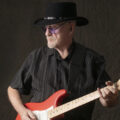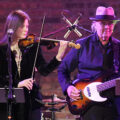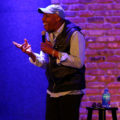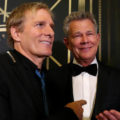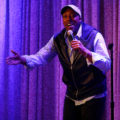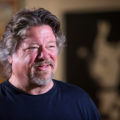Following “Saturday Night Live” and the Senate, Al Franken preps all new City Winery stand-up
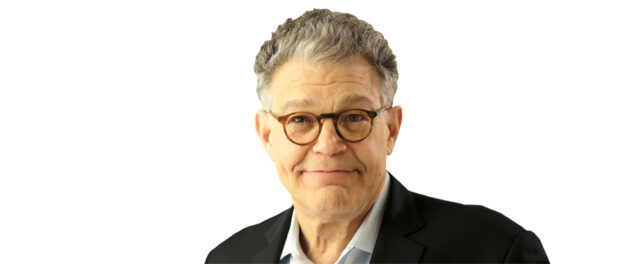 Photo provided by City Winery
Photo provided by City Winery
For decades, the idea of comedy in Chicago is one that has been largely defined by the idea of improvisation. With roots dating back to 1959, The Second City continues to function as America’s premiere improv outlet. Co-founded by writer and teacher Del Close in 1981, ImprovOlympic (iO Chicago) has also proved highly influential, launching comedy troupes like the Upright Citizens Brigade, with both outlets consistently preparing talent for careers on stage and on television while feeding programs like NBC’s “Saturday Night Live.”
Working alongside writer and comedian Tom Davis, comic, author, actor and former U.S. Senator Al Franken cut his teeth performing in Minneapolis as one half of the comedy duo Franken & Davis. The pair would eventually help set “SNL” in motion, with Franken working as a writer and performer from 1975 to 1980 and again from ‘85 to ’95.
As he readies the launch of an entire tour visiting several City Winery locations, performing at both 5 PM and 8:30 PM on Saturday, February 24 and Sunday, February 25 at the West Loop location, Chicago Concert Reviews spoke with the headliner about “An Evening Of New Stand-Up With Al Franken,” fond memories of the Windy City, including filming the movie “One More Saturday Night,” his time in the Senate, curating “The Al Franken Podcast” and much more, lightly edited for length and clarity.
What can fans expect when the tour launches this weekend at City Winery?
Al Franken: Well, it’s a show that’s kind of in formation. And I’m hoping to learn a lot in my four shows in Chicago. I’m hoping to entertain the folks and hoping to do some political stuff – basically almost all political – but some other silly stuff that’s not right on the nose of Trump and Biden, and all of that kind of stuff.
You’re no stranger to the city of Chicago. Any fond memories that stick out here?
Franken: Oh yeah. I shot a film there that didn’t do very well. It’s called “One More Saturday Night. But it was fun shooting. That was near the Skokie area largely. And I went to the kind of last Dead shows, supposedly, with Phil Lesh and everybody [at Soldier Field in 2015]. That had the guy from Phish – Trey Anastasio did it. So, that incarnation. And we thought that was the end of that. But then Dead & Company. But seeing those guys with Trey in Chicago is a big memory. Lemme see…We did the Chicago Convention.
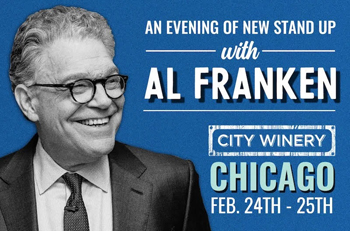 When people think of Chicago and comedy, they think of improv and they think of Second City. Whether it’s an attitude or anything else, what defines Chicago comedy for you?
When people think of Chicago and comedy, they think of improv and they think of Second City. Whether it’s an attitude or anything else, what defines Chicago comedy for you?
Franken: Well, Chicago really is the heart of comedy in this country. I mean, Second City and that improv form and Del Close. I worked at a place called the Dudley Riggs Brave New Workshop in Minneapolis. Del Close came and taught up there. And my partner, Tom Davis, was a member of the cast at Dudley’s while I went off to college. So, he got those improv licks straight from Chicago – straight from Del Close. And, when we write, that discipline helped us a lot.
Do you remember Julia Child bleeding to death, that sketch? We wrote that and we were looking for an end beat. And part of what Del would teach you is to look for an object – try to find an object. Because you’re on stage and you can mime anything, so you grab an object. Kind of the last beat on that was always have a phone with 911 on the set. And she grabs for it, and tries dialing, but it’s a prop phone. And I just remember thinking like, “Damnit, I wish I had taken improv.” Because Tom really did. And it’s a very good talent to have.
I watched a sketch this morning and it was you portraying [former U.S. Congressman from Illinois] Paul Simon during the Clarence Thomas confirmation hearings. Life would eventually come to imitate art. How did you approach that impersonation and what was his response, since I know you guys eventually did meet?
Franken: Oh, he liked it! I think I did him before that at some thing too. I just liked how slow his cadence was – and how deep. So, yeah – I did that at some event. I did Paul talking about killing some time. Because Hubert Humphrey was supposed to be there – and he was late. So they said, “Paul… go out there… and kill… some time.” (Laughing)
By the time you actually walked into the Senate, you’d already been through a delayed recount following an extremely close race. How surreal were those earliest Senate days?
Franken: A little surreal. I mean, I had waited more than six months to get in there. So, then by the time I’m there, it was like, you know, thank god I was there. And then we got to work doing the Affordable Care Act. I rolled up my sleeves and wrote a major provision, and I felt right at home. I wrote a provision on insurance companies having to use at least 80% of their premiums on actual healthcare, not on administrative costs, or advertising, or marketing, or CEO salaries. Insurance companies make about four or five percent profit and pharmaceutical companies make like 15 percent.
I think when the average American thinks about the Senate today, they think about dysfunction – about how hard it now seems to get something done. I would’ve guessed that might have been a process you’d come to loathe – but you always speak of that experience and that position so highly. What did your time in the Senate teach you?
Franken: Oh, I loved the job. And you could get things done. I was the 60th vote for the Affordable Care Act. And I won [my first Senate election in 2008] by 312 votes. If I hadn’t won that, we probably wouldn’t have the ACA. So, I was very happy to have been that 60th vote.
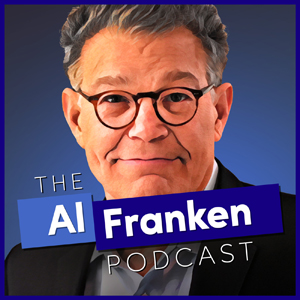 It was interesting looking at some of the guests on “The Al Franken Podcast.” It directly addresses politics, but you’ve also got someone like Jim Downey talking about “SNL.” What’s the podcast experience been like for you?
It was interesting looking at some of the guests on “The Al Franken Podcast.” It directly addresses politics, but you’ve also got someone like Jim Downey talking about “SNL.” What’s the podcast experience been like for you?
Franken: It’s been a lot of fun. I get to pick my guests. And so I do a lot of my interests.
We had Dahlia Lithwick. Dahlia is probably my favorite person [writing about] the Supreme Court. We had Olivia Nuzzi. She’s been on the campaign trail – on the ground. And she had a lot of great insights into what the Trump crowd is like. She had this thing about how it’s something to do in town. So they go. If Elton John was going to be doing a concert, they’d go there, you know? And it was pretty refreshing to hear her take on the Trump crowd.
When I listen to the podcast or read your books or watch your sketches, it’s very obvious you have a respect for storytelling. How important is that idea to you?
Franken: Storytelling is kind of what you do. I guess sometimes you tell jokes and it’s not storytelling. But even jokes usually work toward furtherance of a story. This [show] will be kind of some of that. I’ll be telling some stories.
Whether it’s an author, politician, screenwriter, musician or anything else, who are some favorite storytellers?
Franken: John Mulaney is a great storyteller. Louis C.K. is a great storyteller. Let me see… Jim Gaffigan I think tells a great story. Garrison Keillor would tell great stories, you know? Amy Schumer tells a great story. There’s a lot of them. Some songs are great stories, right? All of the best songwriters certainly are storytellers. I’m a big Deadhead so I could tell you a few stories from them. Bob Dylan.
I think back to the earliest days of the folk music tradition when artists would use music lyrically to address society and speak to the times. But it’s difficult in polarizing times like these for music to play that role the way it once did so effectively. Which makes me think about satire. When used properly, how valuable a tool can comedy and satire be to inform public opinion or beget a conversation that maybe ultimately provokes change? Can it still play that role?
Franken: It can… It can. I remember when I wrote my first big book, “Rush Limbaugh Is A Big Fat Idiot And Other Observations.” I still have people come up to me and say, “I read that when I was a kid and it really affected my view of politics. I became a Democrat and my father was a Republican, etc.” The point of this is to be part of the argument and try to convince people what the way to create a decent society is.
Al Franken performs at City Winery on Saturday, February 24 and Sunday, February 25. For additional details, visit AlFranken.com and and CityWinery.com/Chicago.


